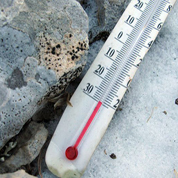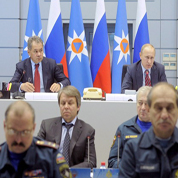Winter’s frost-related damages run into hundreds of lost lives and billions of rubles

The record low temperatures that took over a large part of Russia this winter have left long-lasting negative prints in the country’s memory as the ensuing destructive consequences will, probably, be seriously felt throughout the nation in general and the economy, in particular. This is especially true of the agro sector, and consequently, the national grocery market, as the so-called ‘humus regions,’ housing most of the country’s agro-industrial factories, took most of the brunt of the frost damages.
Commenting on the prevailing weather anomalies in the winter, Valery Dyadyuchenko, the deputy director of the Russian Hydrometeorology and Environmental Monitoring Service, noted that the unprecedentedly abnormal frost that covered a large part of the country has led to severe consequences for both people and economy. In February, Russia’s federal and regional ministries as well as independent experts in the field of evaluation of the consequence of atypical natural phenomena met to gauge the negative effects of the frost. The preliminary findings were far worse than previously predicted.
Preliminary economic damage stands at 5% of national GDP
Thus, according to the Anti-Exigency Center of the Emergency Situations Ministry, which oversees forecasting of the possibility of occurrences of emergency situations in the country, the problems caused by the global climate changes in southern Russia will intensify in 2012. Speaking at a government meeting dedicated to the abnormal frost and its destructive impacts on people and the economy, Russian Emergency Situations Minister Sergei Shoigu reported that about 64 accidents were recorded in the utilities sector, 45 accidents in the housing and communal services sector and 23 accidents in energy industry at the peak of freezing temperatures. Besides, the number of fire outbreaks in apartments and industrial facilities that were caused by misusing heating equipment rose by over 30%.
Talking about the measures already taken, the minister also noted that all material and technical resources and reserve power supply systems were put in a state of alert and readiness. Besides, about 2,500 special warmth-providing places were set up in 590 cities and 685 similar facilities were also installed in other smaller settlement areas. “At the peak of the frost, over 30,000 of people used these places,” Shoigu added. Also, energy production companies also took a serious hit, as energy consumption reached a record level in February. For instance, according to the Moscow government’s press service, power consumption reached 15,700 megawatts, a new record for the city.
“This winter, a substantial part of Russia fell a victim to unprecedentedly abnormal frost that wreaked huge damages, estimated at 5% of GDP, on the country.”
To reassure the citizens, including business leaders, Russian Energy Minister Sergei Shmatko noted that, despite the abnormal cold in several regions, the government has sufficient energy generating capacities to meet all the needs of the population and companies in the country. “Today, the energy need across the country is about 152 gigawatts. We’ve enough reserves for power generation to fully meet all the energy needs of the population and businesses.” Similarly, Regional Development Minister Viktor Basargin noted that 98% of the nation’s housing and utilities companies have enough resources to cope with any emergency situations caused by the record cold. “For example, a reserve of heavy oil fuel estimated at 160,000 tons was formed in the state’s Emergency Fund in 11 regions and 13 locations that can be used to address any frost-related emergencies.”
Though the final and more accurate estimates of the damages have yet to be done, it is already clear today that the scale will be breathtaking. Specifically, according to experts, the total damage wreaked on the regional economies in the southern part of the country could reach about 2% of the nation’s annual GDP, while the total could double to over 4-5% of GDP nationwide.
Human losses stand at hundreds of lives
However, the measures taken by the Emergency Situations Ministry and other official agencies were not enough to protect everyone in danger of freezing. Indeed, the frost-related death toll statistics was heart-breaking. Thus, according to the Health and Social Development Ministry, the abnormal cold killed about 500 people, while over 5,000 others suffered different degrees of frostbite and other cold-related wounds. The lion's share of these victims are mostly homeless individuals, who, despite the assistance being provided by governments at all levels within the framework of social and welfare policies, or charitable programs of churches and volunteer organizations, do not always want to take a full advantage of the social adaptation centers, because they do not want to part with their anti-social ways of life.
For example, a top ranking official at Moscow’s Central Administrative District (CAD) noted that during adverse weather conditions people in critical life circumstances are regularly assisted by the Social Welfare Department. “However, despite, the small number of places in our center for homeless people, these facilities are never completely filled in summer or winter,” Alexander Litoshin, the deputy district head in charge of social policy, noted. “Unfortunately, there are cases, where homeless people, after receiving assistance at the social centers, usually leave, apparently because they don’t want to abandon their traditional antisocial ways of life, such as uncontrollable consumption of alcohol.”
The agro sector, notably, the vineyards, takes the biggest toll
 For the agricultural sector, the effect of the ‘killing frost’ was also equally dramatic. According to the Russian Agricultural Ministry’s data, most part of the country’s 1.2mln hectares of fertile land plots used for cultivating crops fell victims to this year’s adverse winter conditions. This especially true of the southern part of the country, where, according to the Union of Russian Grapes Growers and Winemakers, the agro industry could lose up to half of its annual gross grapes output, while between 10-30% of other agro products such as cereals are under real danger. Specifically, Leonid Popovich, the union president, noted that the overall picture of the scale of damage caused by the freezing temperatures will become clearer in spring. “And, this will depend on how the vineyards had coped with the abnormal weather conditions and the availability of generous supply of internal nourishment that will enable the crops to rejuvenate quickly after the rough weather.”
For the agricultural sector, the effect of the ‘killing frost’ was also equally dramatic. According to the Russian Agricultural Ministry’s data, most part of the country’s 1.2mln hectares of fertile land plots used for cultivating crops fell victims to this year’s adverse winter conditions. This especially true of the southern part of the country, where, according to the Union of Russian Grapes Growers and Winemakers, the agro industry could lose up to half of its annual gross grapes output, while between 10-30% of other agro products such as cereals are under real danger. Specifically, Leonid Popovich, the union president, noted that the overall picture of the scale of damage caused by the freezing temperatures will become clearer in spring. “And, this will depend on how the vineyards had coped with the abnormal weather conditions and the availability of generous supply of internal nourishment that will enable the crops to rejuvenate quickly after the rough weather.”
The most vulnerable agricultural regions that took most of the brunt were the Stavropol and Krasnodar, Astrakhan and Rostov Regions as well as the Republics of Kalmykia and Dagestan. For example, according to the Dagestani Agriculture Ministry, the preliminary estimates of damage from the negative effects currently stand at several billion rubles. Russia’s other “agricultural regions” have also reported similarly appalling statistics. However, the situation in Dagestan was specifically dramatic, forcing the energy minister to recommend putting temporary restriction on electricity consumption in parts of the republic. “Due to the low water levels in reservoirs, the generation of hydropower in Dagestan is not enough. Today, the situation is under control, but if it goes worse, then, we might have to consider introducing limitation on electricity consumption.”
Meanwhile, the owners of businesses damaged by the adverse weather are not only concerned about the current and medium negative impacts, but also over the possible long-term negative influence on several industrial sectors. This negative trend might be clearly illustrated by the wine-producing business, which is currently facing a bleak future, as it will take years to restore the vineyards destroyed by the unprecedented frost. Indeed, all these negative trends have put many previously flourishing businesses on the brink of inevitable bankruptcies. Most notably, the negative consequences will mostly be felt by agro companies. There are three possible solutions to this problem facing the domestic wine industry, all of which do not bode well for both businesses and consumers of their products.
Firstly, it is now absolutely obvious that there will be a deficit in wine production in Russia, a trend that will necessitate increasing wine imports to compensate the deficits in the future. The second probable scenario envisages some winemakers tapping their reserves of wines earlier than previously planned so as to meet their contract obligations and other market exigencies. The effect of this policy is dualistic in nature, because, if the prices of such ‘special wines’ will not be at sky-high levels, then every customer would get access to exclusive sorts of wines. And, the third negative scenario, which is the most unfavorable for all market participants — ranging from the government as the industry regulator, wine producers and consumers — will be the inevitably uncontrollable growth in production of low-quality or outright faked wines.
Commenting on these negative trends, Alexander Tkachyov, the governor of the Krasnodar Region, one of the most seriously hit agro regions in southern Russia, noted that the experts were very serious in their calculations of the damage done, which means this year’s crop harvests are under real threat of destruction. “Of course, today, we can still minimize the scope of this damage, if the right measures are taken quickly,” he added. “Besides, the expected warming of weather and other measures being taken to restore plants can also help avoid the impending enormous loss of harvest in our region.”
Summing up the decisions and steps outlined at the special state meeting, Prime Minister Vladimir Putin instructed profile ministries and departments to keep the adverse weather conditions generated crisis under total control. “Everything that needs to be done should be done, and very fast. Therefore, I request you all of you to prepare your proposals on how to restore destroyed houses, help public and private companies that have suffered from the abnormal cold.”
Anastasia Korotenko took part in the translation of this text from Russian into English.












 Web design,
Web design,